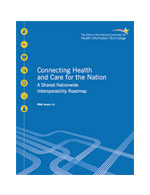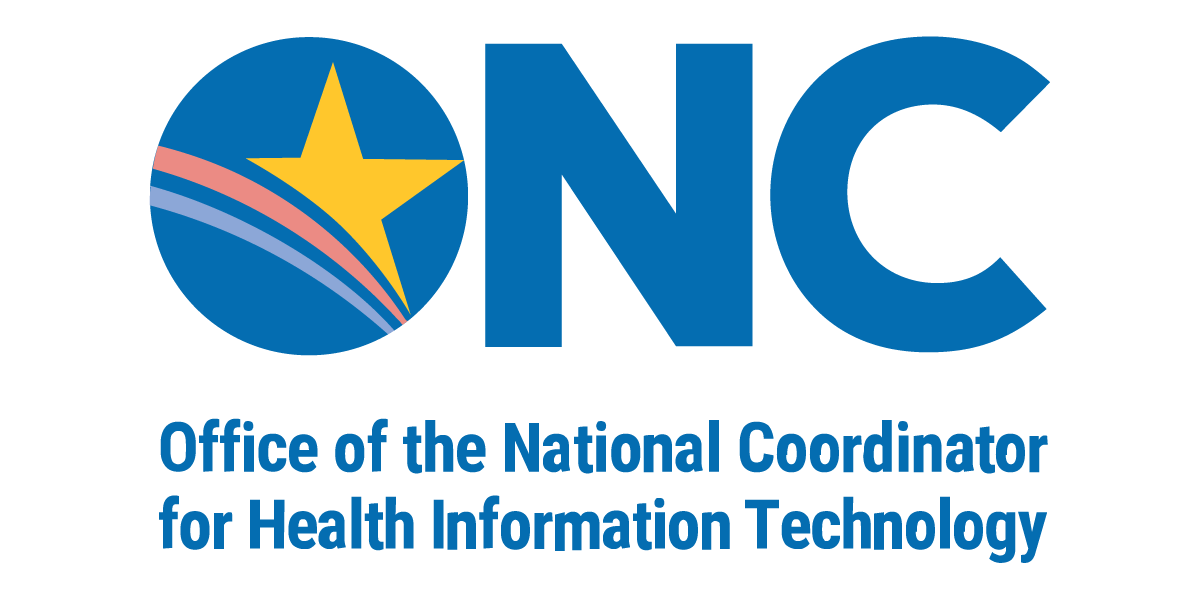 ONC accepted public comments on Connecting Health and Care for the Nation: A Shared Nationwide Interoperability Roadmap Draft Version 1.0. The comment period ended on April 3, 2015.
ONC accepted public comments on Connecting Health and Care for the Nation: A Shared Nationwide Interoperability Roadmap Draft Version 1.0. The comment period ended on April 3, 2015.
The draft Roadmap proposes critical actions that need to be taken by both private and public stakeholders to advance the nation towards a more connected, interoperable health IT infrastructure and was drafted by ONC based on input from private and public stakeholders. The draft Roadmap outlines the critical actions for different stakeholder groups necessary to help achieve an interoperable health IT ecosystem.



Interoperability Comments
I Oppose the Federal plan to impose National Medical Records System to track and analyze patients - and control doctors.
Self
This whole idea virtually destroys the core of patient consent and privacy. It literally opens up a patients history to public abuse by outsiders- not to mention hackers. The confidentiality and privacy of the patient doctor relationship needs to be strengthened- not destroyed. Patients will not otherwise be truthful with their doctors
Please Oppose the Federal plan to impose National Medical Records System to track and analyze patients - and control doctors.
NO Privacy: The Roadmap claims, “The HIPAA Privacy Rule was designed to ensure that individuals’ health information is protected while allowing the flow of health information needed to provide high quality health care.” Also, “all organization regulated by HIPAA must understand in the same way that HIPAA, through its permitted uses and its privacy protections, actually enables interoperability.” (p. 14) HIPAA protects no one’s privacy. It opens up the medical records of everyone, permitting broad access unless a stronger state law exists.
Uses financial penalties to enforcing practitioner compliance with EHRs and interoperability (data sharing): Among other penalties, the Roadmap calls for “requirements/penalties that raise the costs of not moving to interoperable systems.” (p. 39) It’s beginning: “In order to bill for [chronic care management, according to the 2015 Physician Fee Schedule] physicians will be required to utilize certified health IT to furnish certain services to beneficiaries.”
Changes medical practice by giving outsiders access to data: “Providers should have the tools they need to support a cultural shift in the way they practice medicine and use technology that supports the critical role of information sharing.” (p. 50).
Get Government Out of my private life
I disagree with the intent and scope of gathering private health data without a person's permission. You will ruin my doctor-patient private relationship.
You will make my personal data easily accessible to any hacker. I already have scammers contacting me weekly. With my private data being sold in the public arena will make life and trust incompatable.
Who every thought this up should be put on every scammers list and hounded 24/7.
This is a bad idea which invites a future of government control and manipulation.
In simple language, Get the Hell out of my private life.
I OPPOSE the federal plan to impose national medical records system to track and analyze patients and control doctors because:
1. it views patient data as public property rather than personal property: “Data holders … should ensure standards are prioritized, developed and implemented to support the public interest, national priorities and the rights of individuals.” (p. 33).
2. It changes the medical practice by giving outsiders access to data: “Providers should have the tools they need to support a cultural shift in the way they practice medicine and use technology that supports the critical role of information sharing.” (p. 50).
3.It proposes to turn EHR companies into public utilities to create a national medical records system: “Data holders and entities facilitating interoperability of electronic health information should not establish policies or practices in excess of law that limit the availability of electronic health information by another entity that is in compliance with applicable laws and these governance principles.”
My medical records are not open to 'support the public interest' they are personal and private. I do not choose to live in a communist society. In my opinion this national tracking system is part of such a scheme. Stop circumventing our US Constitution and our God-given rights. NO! to any national patient tracking scheme.
See uploaded Word document.
onc_interoperability_comments.docxI desire to continue the federal law that allows state legislatures to enact true medical privacy laws for citizens. I don't want to undo existing state rights. (p. 67).
Patients are not public property.
I don't want their privacy challenged by "new standards that support "the public interest".
: “Data holders … should ensure standards are prioritized, developed and implemented to support the public interest, national priorities and the rights of individuals.” (p. 33)
I don't want the increased risk of hacking of patient data: “As health IT systems have become increasingly connected to each other, cyber threats have concurrently increased at a significant rate. In an interoperable, interconnected health system, an intrusion in one system could allow intrusions in multiple other systems.” (p. 55)
The bedside is private property, not a government "learning system". :
“The goal of this shift is to a nationwide learning health system—an environment that links the care delivery system with communities and societal supports in ‘closed loops’ of electronic health information flow, at many different levels, to enable continuous learning and improved health.”
Patients do not need this invasion in their privacy, and certainly not "new HIPAA privacy rules".
The existing laws that protect patient privacy are already creating unneeded paperwork and should not be replaced by ":new HIPAA privacy rules".
“The HIPAA Privacy Rule was designed to ensure that individuals’ health information is protected while allowing the flow of health information needed to provide high quality health care.” Also, “all organization regulated by HIPAA must understand in the same way that HIPAA, through its permitted uses and its privacy protections, actually enables interoperability.” (p. 14) HIPAA protects no one’s privacy. It opens up the medical records of everyone, permitting broad access unless a stronger state law exists.
I don't want government to invade patient privacy:
“Health information such as personally maintained dietary logs, medical device data such as blood glucose readings and many other bits of information that inform health-related decision-making (both inside and outside the care delivery system) must also be connected in reusable ways in a dynamic ecosystem supported by health IT.” (p. 17)
I don't want patient data accessible to different government agencies and
the invasion of privacy created by the following paragraph:
Healthcare is a private situation which does not need to be imposed/controlled
"As a learning health system evolves, more than individual/patient-specific information from health records will be matched and linked, including provider identities, system identities, and device identities and others to support public health and clinical research.” (p. 24)
I don't want the government to impose penalties for non compliance to their
standards. “requirements/penalties that raise the costs of not moving to interoperable systems.” (p. 39)
This is definitely not what our government is chartered to do.
Costs are best managed under a free enterprise system, not by use of new REGULATIONS AND FINEs..
Proposes to repeal federal law that allows state legislatures to enact true medical privacy laws for citizens.
The Roadmap proposes to undo state’s rights under HIPAA to enact state laws and conform all state laws to federal HIPAA “no privacy” rule.
Views patient data as public property rather than personal property“ Data holders … should ensure standards are prioritized, developed and implemented to support the public interest, national priorities and the rights of individuals.”
Proposes to turn EHR companies into public utilities to create a national medical records system: “Data holders and entities facilitating interoperability of electronic health information should not establish policies or practices in excess of law that limit the availability of electronic health information by another entity that is in compliance with applicable laws and these governance principles.”
I Oppose the Federal plan to impose National Medical Records System to track and analyze patients - and control doctors, based on:
1. Uses financial penalties to enforcing practitioner compliance with EHRs and interoperability (data sharing): Among other penalties, the Roadmap calls for “requirements/penalties that raise the costs of not moving to interoperable systems.” (p. 39) It’s beginning: “In order to bill for [chronic care management, according to the 2015 Physician Fee Schedule] physicians will be required to utilize certified health IT to furnish certain services to beneficiaries.”
2. Proposes to turn EHR companies into public utilities to create a national medical records system
and most importantly,
3. Proposes to repeal federal law that allows state legislatures to enact true medical privacy laws for citizens.
We vehemently oppose this. It is astounding that we have even reached this point where we have to fight for our rights in health care and to get government entirely out of the system. This Roadmap must be opposed entirely! Apart from the vulnerability that continually exists to hack patient data, we vehemently oppose this for the following reasons:
1) Patient data is not public property-period and never should be. It is a trusted, privileged relationship between patient and doctor only.
2) As it is, cyber threats are continually a threat to security. Why then is this even being considered? The fact is, cyber threats are increasing at an alarming rate. To have a massive system as this proposes, is risky at best and ludicrous. I certainly do not wish to have my records and data compromised. Consider how easily Obamacare information was hacked when applications opened online. Consider the recent Sony hacking. Consider the hacking that occurs almost daily, affecting millions of people. To think that this would not be a possibility is flat out stupid and ignorant.
3) An interoperable ecosystem will do the opposite of what it claims.
4) HIPAA was supposed to be a privacy act but in reality has been anything but that. It has demonstrated to have no respect for privacy and in fact, releases the medical information of people to the wrong agencies and individuals. This would allow for complete access UNLESS (emphasis only) a stronger state law exists to protect it. Thank you for listening.